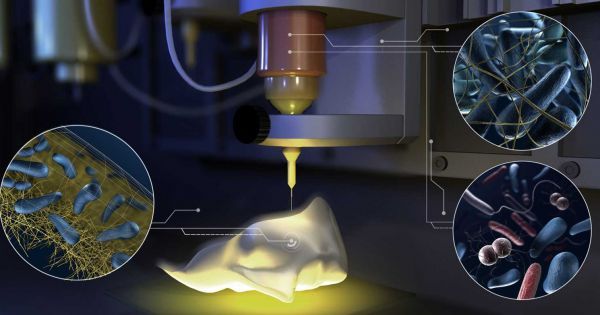Uniti is offering their electric car with five years of free electricity from solar power for Swedish customers thanks to a partnership with E.ON.


Advances in regenerative medicine, particularly stem cells and 3D-bioprinted organs, could soon make heart transplantation an obsolete medical procedure.

3D printing has come a long way. In a new study, scientists explore the potential of using bacteria-laced ink to print living materials.
From pizza to urine-based space plastic and even blood vessels, it seems there’s no limit to what can be 3D printed. A new 3D printing platform, created by ETH researchers led by Professor André Studart, head of the Laboratory for Complex Materials, is advancing the process by working with living materials. The specially designed material is actually an ink infused with bacteria. The machine is then able to print living biochemical designs for a wide variety of purposes, which vary depending on the bacteria used. Their research has been published in Science Advances.

Elon Musk’s Boring Company, which was founded to create tunnels for an underground transportation system in Los Angeles, has released a map illustrating a proposed network for those tunnels.
The Boring Company was i nspired by Musk’s frustrations with LA’s notoriously congested traffic. Operating beneath Interstate 105, the tunnels would hold large electric skates that could transport cars at speeds of up to 150 mph (241 km/h).
Commuters without their own vehicles would be able to travel in communal passenger cars.

China is now the proud owner of the world’s first all-electric cargo ship and has already put the vehicle to use.
As reported by China Daily, the 2,000-metric-ton ship was launched in the city of Guangzhou last month and runs in the inland section of the Pearl River.
Constructed by Guangzhou Shipyard International Company Ltd, it can travel 80 kilometres (approximately 50 miles) after being charged for two hours. As noted by Clean Technica, two hours is roughly the amount of time it would take to unload the ship’s cargo while docked.
These glass bricks serve as solar panels AND windows.


Canada is testing a basic income to discover what impact the policy has on unemployed people and those on low incomes.
The province of Ontario is planning to give 4,000 citizens thousands of dollars a month and assess how it affects their health, wellbeing, earnings and productivity.
It is among a number of regions and countries across the globe that are now piloting the scheme, which sees residents given a certain amount of money each month regardless of whether or not they are in work.


Neuroscientist Marco Iacoboni discusses mirror neurons, autism and the potentially damaging effects of violent movies.